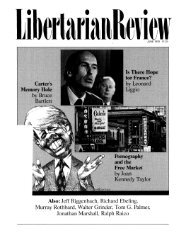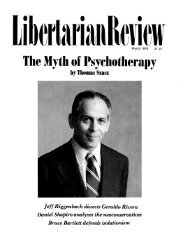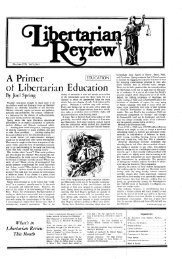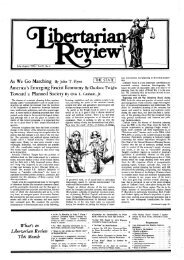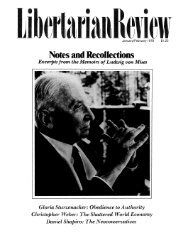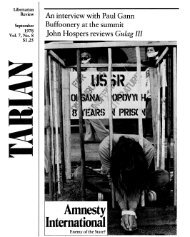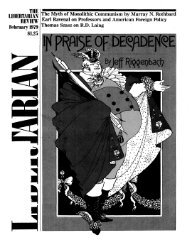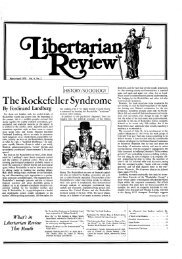The Libertarian Review July 1978 - Libertarianism.org
The Libertarian Review July 1978 - Libertarianism.org
The Libertarian Review July 1978 - Libertarianism.org
Create successful ePaper yourself
Turn your PDF publications into a flip-book with our unique Google optimized e-Paper software.
similarly disadvantaged types could takethem seriously. And anyone simpleenough to act on the information theygive is too simple to be warned off by thetruth. Edward Jay Epstein, on the otherhand, is the prototypical establishmentgunslinger who, under the guise of thethinking man's investigative reporter,blinds us with a dazzling array offacts - all of which miraculously missthe heart of the matter.His Agency of Fear persuasivelydocuments how the Nixon administration'after learning that it lacked theconstitutional power to deliver on its lawand order campaign promises, moved tosieze that power by declaring a waragainst heroin and recruiting a nationalsecret police force (the current DrugEnforcement Administration), directlyresponsible to the White House, to fightit. <strong>The</strong> war was sold to the public by animpressive list of "experts" who declaredthat (1) most street crime was committedby addicts looking for the moneyto supply their habits; (2) that theSPECIAL.OFFERTo get your copy of An EccentricGuide to the United States, speciallyautographed by the author, send$4.95, plus SOc for postage andhandling, to Agora Books, 4611Owensville-Sudley Road, Harwood,Maryland 20776.SATISFACTIONGUARANTEEDIf you are not entirely satisfied, returnthe book within ten days for a promptrefund.IIAGORA BOOKS4611 Owensville-Sudley RoadHarwood, Maryland 20776My check for $5.45 ($4.95 plus 50chandling) is enclosed. Please rush myspecially autographed copy of An EccentricGuide to the United States. Iunderstand that if I am not fullysatisfied, I may return the bookwithin ten days for a prompt refund,no questions asked.PrintNameAddressCityL - ---134IIIIIIIIInumber of addicts was rising daily; (3)that if the heroin traffic was stopped,the crime rate would drop dramatically;and (4) that the heroin traffic could bestopped. And this public relations effortwas continued in the face of mountingevidence that all these assumptions werewoven out of whole cloth.In Epstein's opinion, had Watergatenot sent Nixon scurrying home to SanClemente, the president would haveused his secret police force to establish atotalitarian regime. Good old Watergate.It saved us, and whatever ourfavorite whipping boy intended hisGestapo to be, it simply became, in Epstein'swords, "a protean manifestationof the earlier narcotics agencies." Inshort, apart from the shortcomings inherentin an agency designed to enforcea public policy based on faulty assumptions,there's nothing much wrong withthe DEA. By the same logic, there'snothing much wrong with Epstein'sbook. It does give an accurate accountof how an unscrupulous administrationused the "menace of drugs" for its ownnefarious ends. Yet this account is sosuperficial that it fails to touch thefoundations of the subject it purports toaddress.Agency of Fear, after all, is subtitled"Opiates And Political Power InAmerica" - a promise, at least a stronghint, that the author intends to go to theheart of the matter. Hit a home runanyway. But not only does Epstein strikeout, he doesn't even get the bat off hisshoulder. He fails to see, or flagrantlyomits saying, that we didn't need aNixon to import.totalitarian notions ofdrug law enforcement; that drug lawenforcement is totalitarian- necessarilyso. Its very nature is so quintessentiallyfascistic that to imply it can be reformedis as absurd as proposing reforms forconcentration camps.Consider: <strong>The</strong> sale and possession ofprohibited drugs are activities by or betweenconsenting parties, none of whomhave an interest in filing a complaintwith the authorities. That is, theyare- by definition- victimless crimes.Moreover, they are private activities,usually conducted behind closed doors.How·then can the police know when,where, and by whom a drug crime hasbeen committed? Well, with a few exceptionslike stumbling across one in thecourse of an unrelated investigation, orseeing one committed right under theirnoses, they can't know. Unless, ofcourse, they have prior information.Which they do. Eighty-five to 90 percentof all drug busts- and there weresome 500,000 last year- are the resultof informer activity. Informers identifytargets for Wiretapping and electronicsurveillance, introduce undercovernarcs to sellers, vouch for their credentials,and, in general, keep theirBy its nature, druglaw enforceDlent isso quintessentiallyfascist that to iDlplyit can be reforDled isas absurd as it is topropose refornts forconcentration cantps.employers in business. As one veterannarc put it, "<strong>The</strong>y're our bread and butter.Without them we'd have to close upshop."Few members of the informer armyvolunteer for duty. <strong>The</strong>y are arrestedand then given the choice of prison orcooperating with the authorities. "Cooperate"is a pleasant word, but there isnothing pleasant about it in this context.Here it means identifying and settingup your friends and associates to bebusted by your narc employer. For whoelse can we betray except those whoknow and trust us? Such cooperation,however, is not hard to induce. <strong>The</strong>Draconian sentences imposed on drugoffenders gives the state all the leverageit needs.Coerced informing, in short, is thenecessary foundation of drug law enforcement.Nothing is more antitheticalto democratic principles, nothing morealien to our constitution than the statefrightening citizens into acting as dishonorablyas a person can- saving theirown necks at the price of someone else's.In a land founded as a citadel of pri-<strong>Libertarian</strong> <strong>Review</strong>



